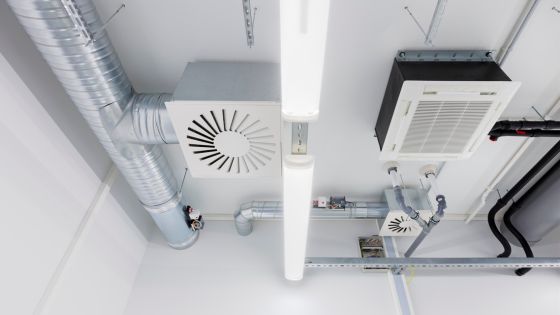HVAC contractor are the unsung heroes of our homes, silently ensuring our comfort and well-being by maintaining optimal indoor temperatures. The selection of the right HVAC system is a critical decision for homeowners, as it directly impacts energy efficiency, indoor comfort, and long-term savings. In this comprehensive guide, we will navigate the intricate process of choosing the perfect HVAC system for your home, providing you with the knowledge and insights you need to make an informed decision. To kick start this journey, it’s essential to begin by finding the right HVAC contractor to guide you through the process.


Understanding HVAC Basics
Different types of HVAC systems
Before delving into the selection process, it’s crucial to understand the fundamental types of HVAC systems available:
- Split systems: These are the most common HVAC systems, consisting of both indoor and outdoor units.
- Packaged systems: Ideal for smaller spaces, all components are housed in a single outdoor unit.
- Ductless mini-split systems: Offering flexibility and zoning, they consist of individual indoor units connected to an outdoor compressor.
Components of an HVAC system
To make an informed choice, you should familiarize yourself with the key components of an HVAC system:
- Furnace: Provides heating by burning fuel (natural gas, propane, or oil) or through electric resistance heating.
- Air conditioner: Cools indoor air by transferring heat outside.
- Heat pump: Offers both heating and cooling capabilities by moving heat in and out of your home.
Sizing your HVAC system
Properly sizing your HVAC system is vital to its efficiency and performance. Consider the following:
- Calculating heating and cooling loads: Understanding your home’s unique heating and cooling needs.
- The importance of proper sizing: Avoiding issues such as uneven temperature distribution and frequent cycling.
- HVAC load calculation methods: Methods used by HVAC contractors to determine the right system size.
Factors to Consider When Choosing an HVAC System
Energy efficiency ratings
Energy efficiency is paramount for long-term cost savings. Two key ratings to consider are:
- SEER (Seasonal Energy Efficiency Ratio): Measures the efficiency of air conditioners. Higher SEER ratings indicate greater efficiency.
- AFUE (Annual Fuel Utilization Efficiency): Applies to furnaces and signifies how efficiently they convert fuel into heat.
Climate considerations
Your local climate plays a significant role in choosing the right HVAC system:
- Matching HVAC systems to your local climate: Ensuring your system can handle temperature extremes.
- Humidity control options: Considering the need for dehumidification or humidification features.
Indoor air quality features
Good indoor air quality contributes to your overall comfort and health:
- Air filtration and purification systems: Assessing the capability of the system to filter out allergens and pollutants.
- Ventilation options: Considering systems that bring in fresh outdoor air to maintain indoor air quality.
Selecting the Right HVAC Contractor
Researching potential HVAC contractors
Choosing the right HVAC contractor is as crucial as selecting the system itself:
- Credentials and certifications: Ensuring the contractor is licensed, bonded, and insured.
- Customer reviews and referrals: Gauging the contractor’s reputation through past customer experiences.
Requesting and comparing quotes
Obtaining multiple quotes allows you to make an informed financial decision:
- In-home evaluations: Why in-person assessments are essential for accurate quotes.
- Written estimates and warranties: Understanding the scope of work and warranty terms offered by each contractor.
Communicating your specific needs
Clear communication ensures that your chosen contractor understands your requirements:
- Discussing budget constraints: Explaining your budgetary limits and exploring financing options.
- Outlining your comfort and efficiency priorities: Conveying your expectations regarding indoor comfort and energy efficiency.
Maintenance and Long-Term Considerations
The importance of regular maintenance
Ongoing maintenance is essential for the longevity and performance of your HVAC system:
- Extending system lifespan: How regular maintenance can prevent premature system failure.
- Maximizing energy efficiency: The role of maintenance in keeping your system running at peak performance.
Warranty coverage and terms
Understanding your system’s warranty is crucial for long-term peace of mind:
- Understanding warranty details: Reading and comprehending the terms and coverage offered by the manufacturer.
- The role of proper maintenance in preserving warranties: How neglecting maintenance can void your warranty.
Future upgrades and adaptability
Consider the future when making your HVAC system choice:
- Considering technological advancements: Preparing your system for potential upgrades and innovations.
- Ensuring system compatibility with future needs: Evaluating whether your chosen system can adapt to changes in your home’s requirements.
Selecting the right HVAC system is a significant decision that requires careful consideration of various factors. By understanding HVAC basics, evaluating energy efficiency, choosing a reputable HVAC contractor, and planning for maintenance and future needs, you can ensure your home remains comfortable and energy-efficient for years to come. Remember that your HVAC contractor is your trusted guide in this process, so make your selection wisely, and enjoy the benefits of a well-suited HVAC system in your home.























